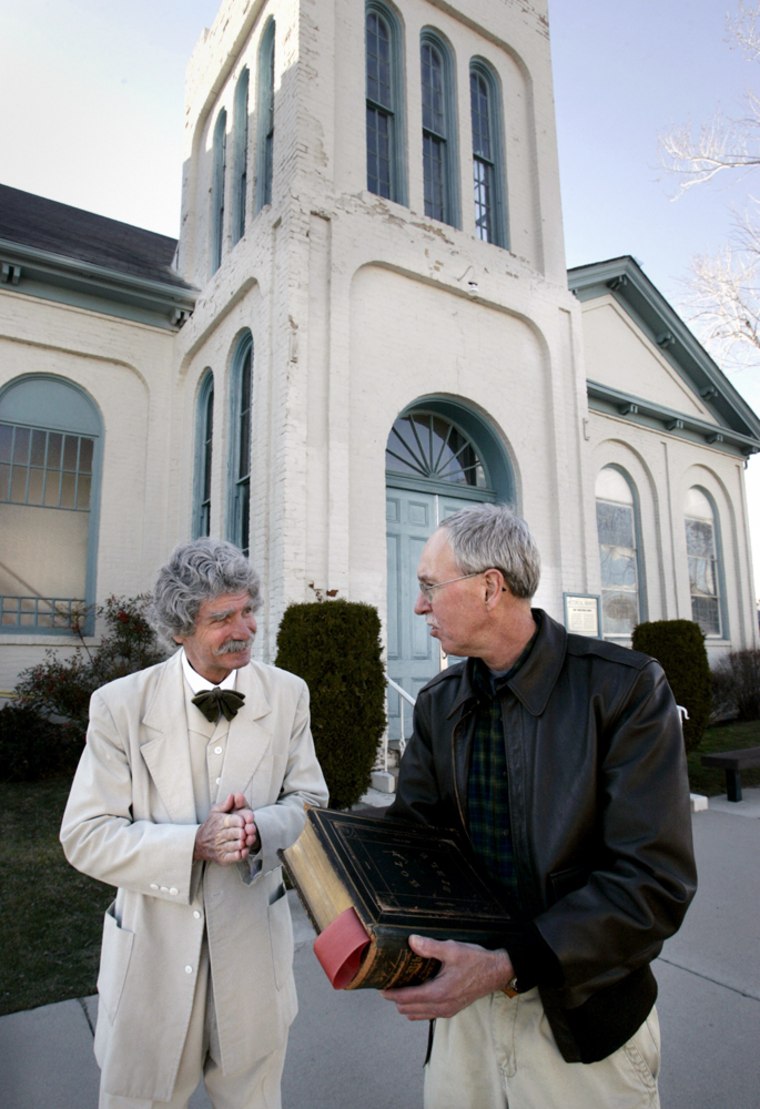In his 20s, Mark Twain was well-known for his carousing at Nevada gold rush saloons, irreverent views of the establishment and a skeptical attitude toward organized religions.
Now, the creator of Huckleberry Finn and Tom Sawyer is getting attention for a little-known good deed: helping the construction of a frontier church in the 1860s.
Twain’s name is being evoked by both sides in a dustup over plans to demolish the First Presbyterian Church in Carson City to make room for a new one. The plans are on hold while the city and church negotiate a proposal to save it.
At the request of two church trustees, Twain raised $200 — worth about $2,200 today — to help complete construction of the church by charging admission to his January 1864 “roast” of Nevada lawmakers in Carson City, the state capital.
At the time, Twain was a reporter for the Territorial Enterprise in nearby Virginia City. His brother, Orion Clemens, was a church member and secretary of the Nevada Territory.
Church officials have said restoring the building would cost as much as $5 million, more than double the cost of building a new one, but the National Trust for Historic Preservation and other groups argue it would be a mistake to tear down the humble brick church.
Not only is the church a rare link to Nevada’s territorial days, preservation proponents say, but it’s one of only four remaining buildings associated with Twain in Nevada.
Church officials say that while they appreciate his fundraising, they think too much is being made of his minor association with the church. Twain was not a member of the congregation, they said, and there’s no proof he ever set foot inside the church during his nearly three-year stay in Nevada.
“It’s only by his association with his brother that he raised money for the church,” said Ken Pearson, chairman of the building committee.
Other church members note what they call Twain’s anti-Christian beliefs.
“I have read where he was an atheist,” Jean Schmid said after a hearing on the demolition permit. “And I’m sorry he was ever mentioned” in connection with the church.
In “What Is Man? And Other Philosophical Writings,” Twain wrote: “I believe in God the Almighty. I do not believe He has ever sent a message to man by anybody, or delivered one to him by word of mouth, or made Himself visible to mortal eyes at any time or in any place.”
However, he still looked kindly on churches, said Robert H. Hirst, head of the Mark Twain Project at the University of California in Berkeley.
“He sees churches as a good thing to support because they help the community. He supports their social functions, such as raising money for the poor,” Hirst said.
Several Territorial Enterprise columns in which Twain mentioned church fundraisers show his commitment to the cause was deeper than thought, Nevada State Archivist Guy Rocha said.
If he ever came into money, Twain wrote in one, “I shall donate my salary to charitable institutions. I will finish building this chronic brick church here, and lease a high-priced parson to run it. Also, an exorbitant choir. Everything connected with the church shall be conducted in the bulliest manner.”
